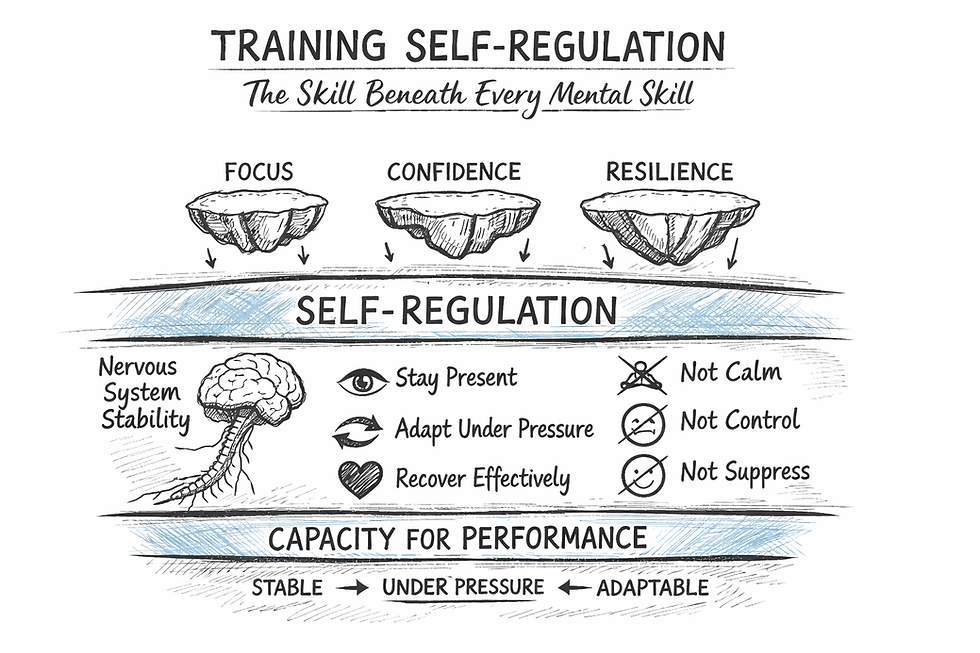5 Ways Emotional Regulation Helps with Athletes Physical Performance
- Kate Allgood
- Jun 22, 2023
- 3 min read
Updated: Dec 18, 2023
The link between emotional control and physical performance in athletes is a fascinating area of study that has gained significant attention in the area of mental performance training. It is widely recognized that emotions can have a profound impact on an athlete's performance. Here are five ways that your emotions and learning to manage them can impact your physical performance:
1. Performance Enhancement
Emotional control plays a crucial role in enhancing an athlete's performance. By managing emotions effectively, athletes can remain focused, confident, and motivated during competition. For example, staying calm under pressure can prevent anxiety from interfering with their physical abilities, allowing them to perform at their best.
2. Attention and Concentration
Emotions can influence an athlete's attention and concentration levels. High levels of emotional arousal, such as anger or excitement, can lead to distractions and decreased focus on the task at hand. On the other hand, maintaining emotional stability and control helps athletes direct their attention to relevant cues, make quick decisions, and execute precise motor skills.

3. Decision Making
Emotional control is linked to rational decision-making processes. Athletes who can regulate their emotions are less likely to make impulsive or irrational decisions that could negatively impact their performance. By maintaining composure, athletes can evaluate situations objectively, strategize effectively, and choose appropriate responses during high-pressure moments.
4. Resilience and Mental Toughness
Emotional control contributes to an athlete's resilience and mental toughness. Sporting events often involve setbacks, failures, or adversities, which can evoke strong emotions. Athletes with well-developed emotional control skills can bounce back from setbacks more quickly, maintain their motivation, and persevere through challenging situations.
5. Team Dynamics
Emotional control affects not only individual athletes but also team dynamics. Athletes who can regulate their emotions effectively contribute to a positive team environment. They can handle conflicts constructively, communicate clearly, and support their teammates during both success and failure. This emotional stability fosters team cohesion and enhances overall performance.
To develop emotional control and optimize your physical performance, athletes can engage in various strategies, including mindfulness training, relaxation techniques, and visualization exercises. Mental performance coaches often work closely with athletes to help them understand their emotions, develop coping strategies, and integrate emotional control into their training and competition routines.
It's important to note that achieving complete emotional control is not the goal. Emotions are a natural part of the human experience and can provide valuable information. The key is to develop the ability to acknowledge, understand, and manage emotions effectively, allowing athletes to optimize their physical abilities.
If you are interested in learning more about how we can help you enhance your physical performance through mental skills training, please contact us.
To your success,
Kate
About: Kate Allgood is trained in the field of applied sport psychology. She holds two Masters degrees in psychology where she graduated with distinction. She has spent the past 14 years working one on one with high school, college, Olympic, and professional athletes to help them with their mindset, mental performance and mental skills training. Kate has also been a consultant for professional teams, including the Anaheim Ducks primary minor league affiliate the San Diego Gulls, to help the team and players develop their mental game. It is important to note that while Kate has graduate school training in applied sport psychology and general psychology, she does not diagnose or treat clinical disorders, and is not a licensed psychologist.
**The information provided is not to dispense medical advice or prescribe the use of any technique, either directly or indirectly, as a form of treatment for physical, emotional, or medical problems, without the advice of a physician. The information provided is only to offer information of a general nature to help you in your quest for high performance. If you know or suspect you have a health problem, it is recommended you seek your physician's advice.



Comments